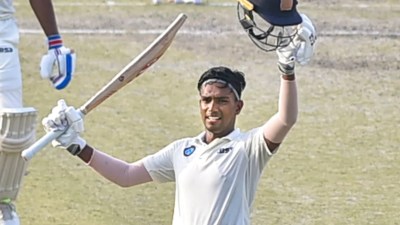Punjab and Haryana HC: Citing ‘written & oral’ complaint, CJ reassigns case listed for order to himself— ‘in interest of institution’
Underlines power as ‘master of roster’ to reassign cases, ‘uphold public trust reposed in judiciary by litigants‘
 The order reopens the debate on the ‘master of roster’ issue where the Chief Justice, as administrative head of the court, has the power to assign cases
The order reopens the debate on the ‘master of roster’ issue where the Chief Justice, as administrative head of the court, has the power to assign casesChief Justice Sheel Nagu of the Punjab and Haryana High Court has withdrawn a corruption case — on which judgement had been reserved — from another judge’s bench and assigned it to himself, attributing his action to “oral and written” complaints he had received.
In an order on Friday, in which he dismissed a challenge against his decision, Chief Justice Nagu underlined the Chief Justice’s administrative control over court rosters and authority to reassign judicial work.
Elaborating on the decision to reassign the matter to himself from Justice Mahabir Singh Sindhu, who had heard and reserved judgment on the matter, Justice Nagu cited “the receipt of complaint, (oral as well as written)… which impelled the Chief Justice to requisition the record of this case from the said Single Bench and constitute another Single Bench comprising of Chief Justice on 12.05.2025 at 03.30 P.M. to give quietus to the complaint, draw curtains to the controversy and save the institution and the concerned Judge from any further embarrassment by deciding the case as expeditiously as possible”.
Justice Sindhu had reserved the case for verdict on May 2.
The order reopens the debate on the ‘master of roster’ issue where the Chief Justice, as administrative head of the court, has the power to assign cases.
Chief Justice Nagu stated in the order: “Powers of Chief Justice in his capacity as Master of the Roster are wide, pervading and plenary. These powers are circumscribed by only one consideration i.e. to protect the interest of the institution from being tarnished and to uphold the public trust reposed in judiciary by litigants.”
The case, Roop Bansal vs State of Haryana and others, seeks to quash a corruption FIR dated April 17.
It has seen multiple twists. First filed in January 2025, it came up before Justice N S Shekhawat who recused himself on January 14.
It was then withdrawn at the request of the petitioner’s counsel before Justice Manjari Nehru Kaul on February 13. The case was re-filed on April 7 by Advocate JK Singla (whose cases are not listed before Justice Kaul), resulting in its assignment to Justice Sindhu.
After arguments concluded and the order was reserved on May 2, the Chief Justice reassigned the case on May 10 following the “written and oral” complaints. It was listed for rehearing before Chief Justice Nagu on May 12.
It will now be heard by Chief Justice Nagu’s bench on May 26. The Enforcement Directorate, represented by special counsel Zoheb Hussain, has been brought in due to links with ongoing PMLA proceedings.
The petitioner’s lawyers, including senior advocates Mukul Rohtagi, Puneet Bali and Rakesh Nehra, had objected to the reassignment. They argued that a “matter which is heard and reserved by a Bench holding roster, cannot be withdrawn from that roster to be heard by any other Single Bench including that of the Chief Justice”.
They also cited the 2018 ruling in Shanti Bhushan vs Supreme Court of India on the master of roster issue, arguing that once a matter is reserved, the power to reallocate becomes limited.
Chief Justice Nagu dismissed the argument, citing precedents and reiterating the scope of his administrative authority. Referring to a 2015 full bench decision of the Allahabad High Court, he said: “In case Hon’ble Chief Justice is of the opinion that a particular case is to be listed before other Bench for fresh hearing, then necessarily, it implies that an order should be passed with regard to withdrawal of such cases by applying mind to individual case.”
He said that “if an exception to this power is accepted by excluding those cases which are heard and reserved, then the object behind this power will stand defeated.”
The order also tackled the larger issue of institutional credibility. ‟In such situations, the reputation of the Bench which “heard and reserved” the case to be withdrawn is at stake. On the other hand is the overall reputation of the institution and public trust of people at large in the judicial system. In this piquant situation, if the Chief Justice chooses the latter, then in my humble and considered opinion the Chief Justice stands by his oath and public trust,” Chief Justice Nagu wrote.
He also underlined the need for swift action, noting, “Since the matter had been heard and reserved by Justice Mahabir Singh Sindhu on 02.05.2025 and the knowledge of the complaints was received by the Chief Justice as late as on 08.05.2025/09.05.2025, there was very little reaction time available.”
He continued, “In the attending factual scenario, if the Chief Justice had not taken preventive emergent steps as aforesaid, then the Chief Justice would be failing in his duty and belying the oath taken by him.”
Citing Anil Rai vs State of Bihar (2001), Chief Justice Nagu pointed out that if a judgment is not delivered within six months, either party can request the Chief Justice to transfer the case for fresh hearing. “The only course available to the Chief Justice in the limited reaction time was to withdraw the heard and reserved case from the Single Bench of Justice Mahabir Singh Sindhu to be listed before another Single Bench,” he said.







